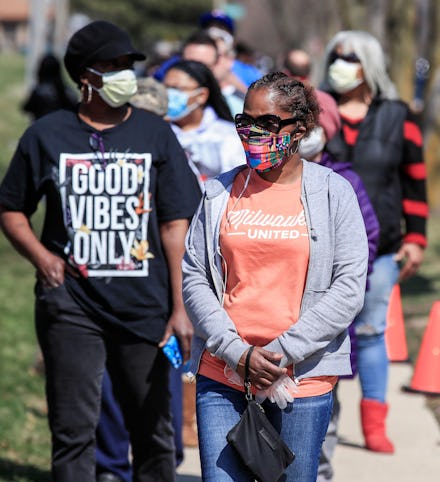Wisconsin Republicans bent over backward to protect a conservative justice. He lost anyway

Earlier this month, Wisconsin Republicans overrode efforts by the state's Democratic governor to postpone Wisconsin's primary election and expand access to mail-in voting. The governor, Tony Evers, had attempted the last-minute change in light of ongoing concerns about holding an in-person election amid the coronavirus pandemic, but Republican lawmakers in the state overruled his order and, backed by the state's conservative Supreme Court, kept the in-person election in place as originally scheduled. The gambit was thought to be so that conservatives could hold onto a state Supreme Court seat and keep their ideological lean intact on the state's highest court, but the power bid backfired. Despite the party's use of a number of voter suppression tactics, Democratic candidate Jill Karofsky defeated conservative Daniel Kelly, it was announced Monday.
While many states postponed their primaries to protect citizens during the public health crisis, Wisconsin Republicans were more focused on using shady tactics to ensure Kelly held onto his seat. If Kelly had done so, it would've left Democrats with no chance to flip the Wisconsin Supreme Court's ideological lean until the next state Supreme Court election in 2023.
The election results released Monday show that Republicans' plans backfired. With Karofsky's win, the conservative bloc on the state's high court was weakened from 5-2 to 4-3. Slate noted that if any of the remaining conservative justices step down for any reason, Evers could flip the court by naming a liberal-leaning replacement.
In a statement released on Twitter, Karofsky sent a "heartfelt thank you" to her supporters "who have made their voice heard in [an] unprecedented election." However, she lamented the conditions under which the election took place.
"Although we were successful in this race, the circumstances under which this election were conducted were simply unacceptable," Karofsky said in a statement. "Nobody in this state or in this country should have been forced to choose between their safety and participating in an election."
Republicans used a number of tactics to suppress Wisconsin voters. Although Evers was initially on board with holding the elections as planned, he was forced to change course after Democrats in the statehouse urged him to reconsider.
Evers suggested mailing every voter in Wisconsin a ballot, but Scott Fitzgerald, the Republican leader of the Wisconsin Senate, called the idea a "fantasy" and "completely disingenuous." In addition, Republicans refused to lift a provision requiring absentee ballots have signatures from both a voter and witness, which might've required some people to break social distancing rules in order to get a witness to sign their ballot.
When election day rolled around last week, voters in Milwaukee, a city of over 500,000 people with large communities of color, had just five polling locations open compared to its usual 180. This resulted in voters having to wait for hours — all during a pandemic when everyone is encouraged to practice social distancing and stay away from crowds.
Tactics in Wisconsin have been widely condemned by advocates. Referring to Wisconsin's election as "voter suppression on steroids," Molly McGrath, a voting rights campaign strategist with the American Civil Liberties Union, told Business Insider, "The bottom line is no one should have to choose between protecting their health and protecting their right to vote."
In a press release, the Human Rights Campaign applauded Karofsky's victory. HRC President Alphonso David said, "Last week, Republicans on both the state and national level put their own politics ahead of the health and safety of Wisconsinites in an effort to retain a seat on the state Supreme Court."
"Yet, despite those historically loathsome efforts, they failed, their candidate lost and the voters they intended to suppress overcame those efforts,” David added. “These results show that the Trump campaign’s unprecedented $10 million effort to limit access to voting can, and will again, fail."